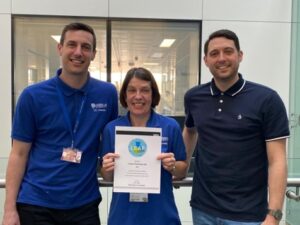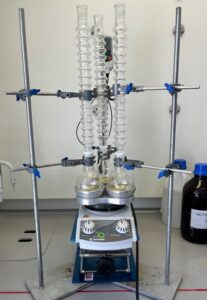The Central Teaching Laboratories and the Department of Chemistry at the University of Liverpool (UK) has published an in-depth study that reports upon their implementation of Asynt laboratory equipment across multiple undergraduate teaching modules as they strive to meet their primary sustainability goals, reducing waste and to become net zero by 2035.
Driven by the global energy crisis, and the need to address laboratory waste to help fight climate change, the Central Teaching Laboratories chose to invest in Asynt DrySyn heating blocks and CondenSyn waterless condensers. This was thanks to a successful sustainability bid from Dr Stephen Brough and Lynne Chapman. Testing of these against traditional heating blocks and condensers by student Alexander Rain in undergraduate experiments showed tremendous improvement to the sustainability of the department.

Stephen Chappell – Lynne Chapman – Stephen Brough winning the LEAF award for the Central Teaching Laboratories
3 heated reactions, no oil = significant reduction in electricity usage
Dr Gina Washbourn, lecturer in Chemistry commented “As a department we are constantly exploring ways to cut down on our electricity usage. We chose to standardise on DrySyn MULTI heating blocks as they can accommodate 3 heated reactions, no oil, simultaneously. Our testing of these energy efficient and easily configurable heating blocks was carried out during two different reflux reactions. On average we more than halved our electricity consumption compared to a traditional single position heating block. Particularly for overnight or longer duration reactions, the DrySyn MULTI heating blocks will save a considerable amount of both energy and money. Knowing that DrySyn uses approximately 35% less energy to heat than a typical oil bath means we’re working more sustainably in multiple ways too by replacing this hazardous heating method”.

Dr Washbourn added “Replacing traditional Liebig water condensers with CondenSyn waterless condensers across all our undergraduate chemistry experiments has proven a great success. The CondenSyn air condensers have been seamlessly implemented into a multitude of experiments, including both refluxes and distillations. We have found that using the CondenSyn equipment for longer reactions is not only more economical due to water usage savings, but also less hazardous, as Liebig condensers often cause floods through leakages. In addition, the CondenSyn apparatus is much simpler in terms of set-up and manoeuvrability in the fume hood. We have seen no significant variation in reaction yield, quality of product or reaction time, hence the switch is a success”.
To learn more about DrySyn heating blocks and CondenSyn waterless condensers please visit www.asynt.com/products/benchtop-synthesis-tools/drysyn-range/ and www.asynt.com/products/benchtop-synthesis-tools/condensyn-air-condensers/ respectively.
To see the full CondenSyn evaluation study undertaken by the University of Liverpool please click HERE or the image below:
To see the full DrySyn evaluation study undertaken by the University of Liverpool please click HERE or the image below:
Download this press release in full in PDF format HERE.
The Chemistry Department at the University of Liverpool is internationally known for its research in fields such as materials chemistry, chemistry of world health, chemical models, energy, interfaces, organic synthesis, and catalysis. For further information please visit www.liverpool.ac.uk/chemistry/about-us/
The Central Teaching Laboratories (CTL) at the University of Liverpool are a dedicated and collaborative teaching space for undergraduate students across the Faculty of Science and Engineering, with focus on the areas of Chemistry, Physics and Environmental Sciences. The CTL is a nationally recognised facility of teaching excellence and was awarded the Collaborative Award for Teaching Excellence (CATE) by the Higher Education Academy (HEA) in 2016. Improving sustainability for our undergraduate laboratories is ongoing thanks to the work by the CTL and Chemistry staff, including Dr Cate Cropper, Dr Stephen Brough, Dr Gina Washbourn, Lynne Chapman, Joshua Hicks and Stephen Chappell. For further information about the CTL, please visit https://www.liverpool.ac.uk/central-teaching-hub/news/articles/central-teaching-laboratory-wins-teaching-excellence-award/
Further reading
You may be interested in our blog; “A Quick Introduction to Parallel Synthesis”







